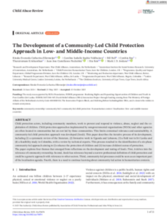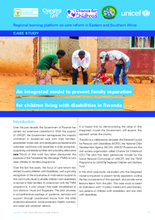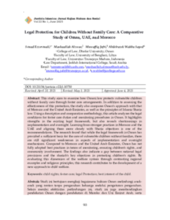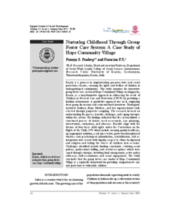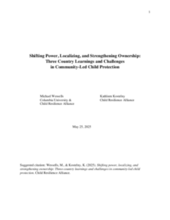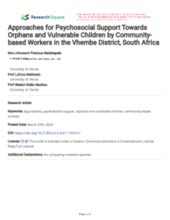Displaying 1 - 10 of 312
This video highlights the rise of a locally led movement in Ethiopia, where Christian leaders and organizations are transforming child welfare practices following the end of intercountry adoption. It showcases the impact of the CAFO-supported DEBO Alliance as churches and advocates embrace domestic adoption and best practices to bring hope and lasting care to vulnerable children and families.
This paper outlines the development of a community-led child protection approach (Seeds), created through a multi-stage process involving a systematic literature review, formative research in Uganda and Lebanon, a field test in Sri Lanka, a feasibility study in Colombia, and expert review, resulting in a six-phase model designed to strengthen children’s protection and their sense of safety.
The article presents an in‑depth interview with the organisation This Life Cambodia, which works at the grassroots level in Cambodia to empower local communities around issues of social justice. It explores how community‑driven family‑strengthening approaches are applied in contexts of complex vulnerability, emphasising the importance of locally led support networks, culturally appropriate practices, and the agency of caregivers in sustaining positive family and community outcomes.
This article explores China’s Child Directors System, a nationwide initiative that appoints trained community members to safeguard vulnerable children and connect them with essential services. It highlights the system’s strengths—such as early intervention, broad coverage, and multi-sector collaboration—while noting its potential as a model for other countries.
This video explores efforts to enable children with disabilities in Rwanda to grow up in safe and caring families using an integrated approach which saw collaboration between the child protection, health, education and social protection sectors.
Over the past decade, Rwanda has reformed its care system to prioritize family-based care, with recent efforts focusing on supporting children with disabilities through a multi-sector, community-based approach. This short case study explains why this integrated model is important to prevent family separation, outlines the key components of this approach, and provides some lessons learnt from the pilot.
This study analyzes how Omani law protects vulnerable children without family care through foster arrangements, comparing it with practices in Morocco, the UAE, and the principles of Islamic Sharia law. While Oman’s legal framework provides a foundation for care, the research highlights weaknesses in implementation and oversight, recommending stronger monitoring, greater community involvement, and closer alignment with both regional best practices and Sharia objectives.
This study examines the group foster care model at Hope Community Village in Kerala, India as an innovative, family-based approach to supporting children in need of care and protection. Findings show the model delivers rights-based, comprehensive care aligned with the Convention on the Rights of the Child, while highlighting challenges related to funding, policy, staffing, and social acceptance, and demonstrating its potential as a replicable framework for child protection.
This report synthesizes learning on community-led child protection in Sierra Leone, Kenya, and India. It shows the power of communities' own agency and action on behalf of children and underscores the importance of ownership.
This qualitative exploratory-descriptive study outlines alternative approaches to psychosocial support for Orphans and Vulnerable Children in four municipalities of Vhembe district in Limpopo Province, South Africa, in the form of community-based interventions.

